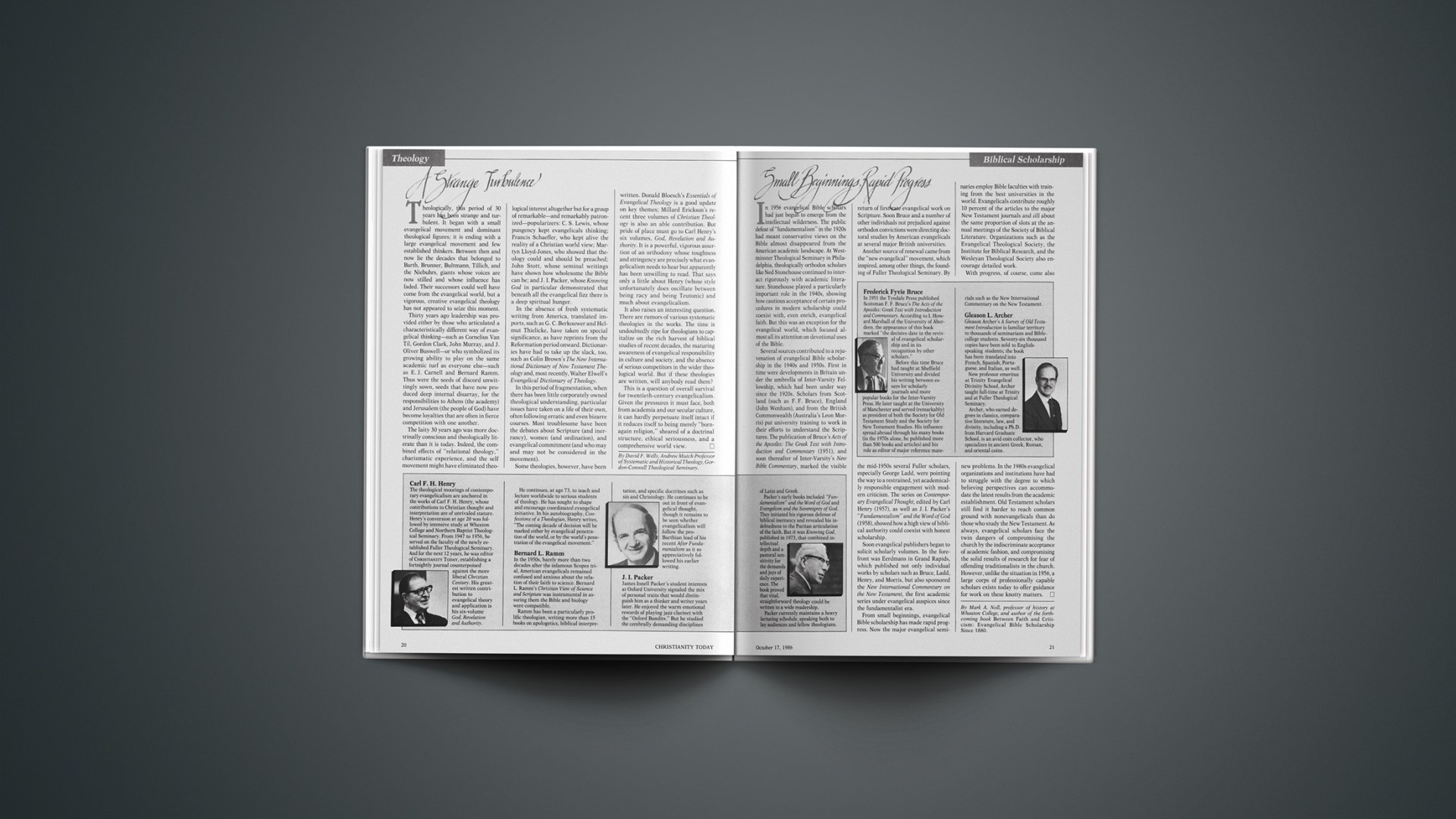In 1956 evangelical Bible scholars had just begun to emerge from the intellectual wilderness. The public defeat of “fundamentalism” in the 1920s had meant conservative views on the Bible almost disappeared from the American academic landscape. At Westminster Theological Seminary in Philadelphia, theologically orthodox scholars like Ned Stonehouse continued to interact rigorously with academic literature. Stonehouse played a particularly important role in the 1940s, showing how cautious acceptance of certain procedures in modern scholarship could coexist with, even enrich, evangelical faith. But this was an exception for the evangelical world, which focused almost all its attention on devotional uses of the Bible.
Several sources contributed to a rejuvenation of evangelical Bible scholarship in the 1940s and 1950s. First in time were developments in Britain under the umbrella of Inter-Varsity Fellowship, which had been under way since the 1920s. Scholars from Scotland (such as F. F. Bruce), England (John Wenham), and from the British Commonwealth (Australia’s Leon Morris) put university training to work in their efforts to understand the Scriptures. The publication of Bruce’s Acts of the Apostles: The Greek Text with Introduction and Commentary (1951), and soon thereafter of Inter-Varsity’s New Bible Commentary, marked the visible return of first-rate evangelical work on Scripture. Soon Bruce and a number of other individuals not prejudiced against orthodox convictions were directing doctoral studies by American evangelicals at several major British universities.
Another source of renewal came from the “new evangelical” movement, which inspired, among other things, the founding of Fuller Theological Seminary. By the mid-1950s several Fuller scholars, especially George Ladd, were pointing the way to a restrained, yet academically responsible engagement with modern criticism. The series on Contemporary Evangelical Thought, edited by Carl Henry (1957), as well as J. I. Packer’s “Fundamentalism” and the Word of God (1958), showed how a high view of biblical authority could coexist with honest scholarship.
Soon evangelical publishers began to solicit scholarly volumes. In the forefront was Eerdmans in Grand Rapids, which published not only individual works by scholars such as Bruce, Ladd, Henry, and Morris, but also sponsored the New International Commentary on the New Testament, the first academic series under evangelical auspices since the fundamentalist era.
From small beginnings, evangelical Bible scholarship has made rapid progress. Now the major evangelical seminaries employ Bible faculties with training from the best universities in the world. Evangelicals contribute roughly 10 percent of the articles to the major New Testament journals and till about the same proportion of slots at the annual meetings of the Society of Biblical Literature. Organizations such as the Evangelical Theological Society, the Institute for Biblical Research, and the Wesleyan Theological Society also encourage detailed work.
With progress, of course, come also new problems. In the 1980s evangelical organizations and institutions have had to struggle with the degree to which believing perspectives can accommodate the latest results from the academic establishment. Old Testament scholars still find it harder to reach common ground with non-evangelicals than do those who study the New Testament. As always, evangelical scholars face the twin dangers of compromising the church by the indiscriminate acceptance of academic fashion, and compromising the solid results of research for fear of offending traditionalists in the church. However, unlike the situation in 1956, a large corps of professionally capable scholars exists today to offer guidance for work on these knotty matters.
By Mark A. Noll, professor of history at Wheaton College, and author of the forthcoming book Between Faith and Criticism: Evangelical Bible Scholarship Since 1880.




